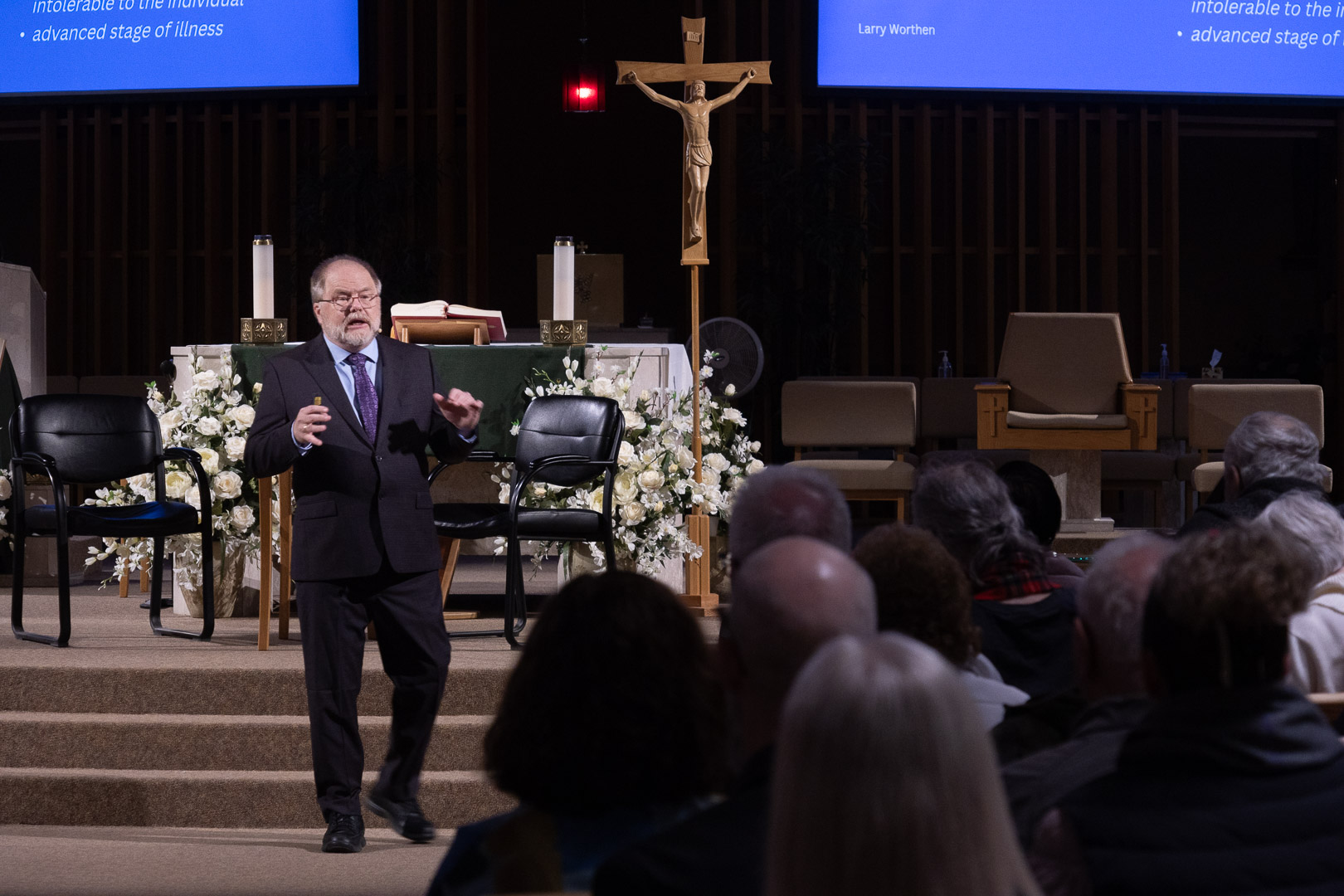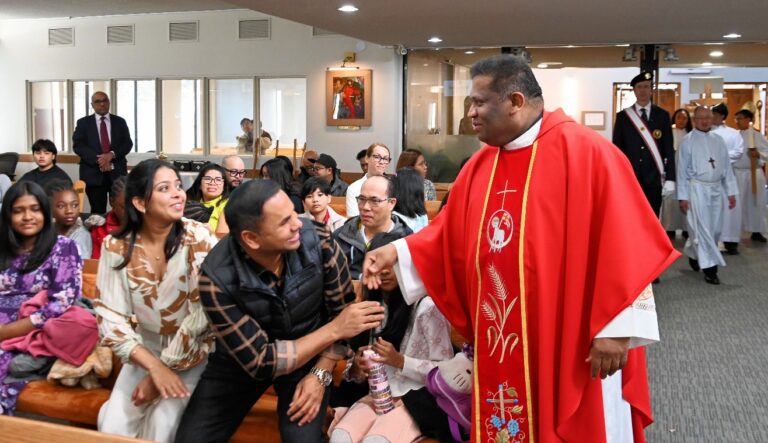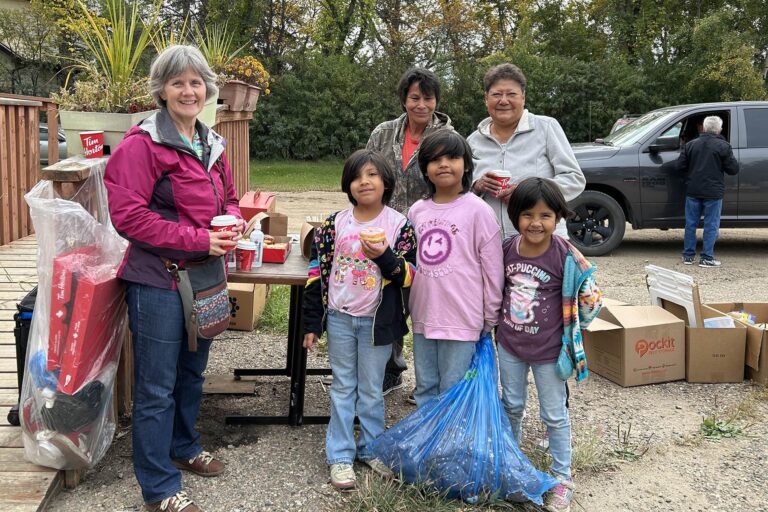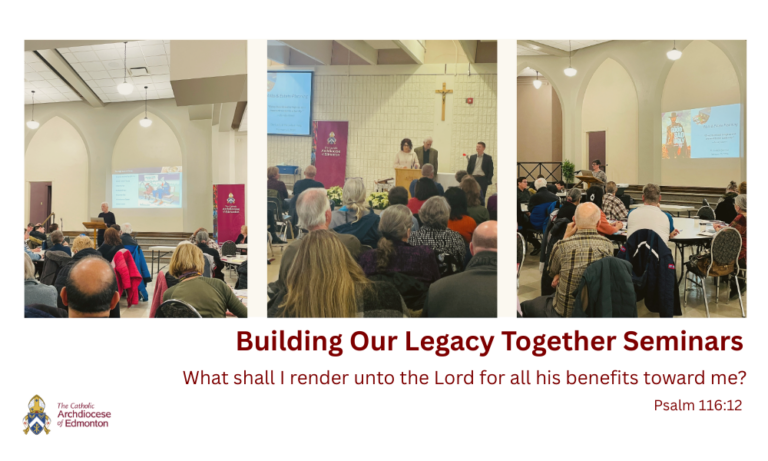Nohl Macdonald is still in high school, but that hasn’t prevented him and many others in the Edmonton Archdiocese from speaking out against the expansion of assisted suicide and euthanasia in Canada.
Macdonald was amongst the crowd of more than 500 people (in person and online) who attended a Feb. 8 public lecture to equip Catholics and other people of goodwill to speak out against a culture of accepting assisted suicide and euthanasia – also known as Medical Assistance in Dying (MAiD).
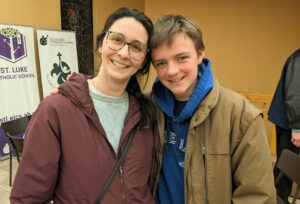
“It’s a conviction. It’s an opportunity to take a stand,” said Macdonald, 15, a high school student who belongs to Our Lady of Perpetual Help parish. “Because I know about MAiD, I believe that this knowledge is God giving me an option to do something about it.”
“If MAiD continues to be expanded to those with mental disabilities, then this becomes a possibility that [anyone could access MAiD],” MacDonald said. “This is a danger for everyone. I think that’s wrong.”
The lecture, at Our Lady of Perpetual Help parish in Sherwood Park, was part of a series of events in the Archdiocese of Edmonton led by Deacon Larry Worthen, executive director of the Christian Medical and Dental Association of Canada.
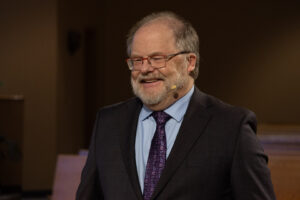
The Catholic lawyer and deacon helped Catholics learn more about MAiD and how to speak clearly in opposition to its expansion.
According to the latest statistics from 2022, more than 44,958 Canadians have died by euthanasia and assisted suicide since MAiD was legalized in 2016. Plans by Ottawa to expand MAiD to patients whose sole condition is mental illness have been delayed until 2027.
Euthanasia and assisted suicide deaths have quadrupled to 4.1 per cent in 2022 from one per cent of all deaths in Canada in 2017, the first full year Medical Assistance in Dying was legal.
“We’re way out ahead,” Deacon Worthen said in an interview prior to his lecture.
“We are even ahead of the Netherlands. The Netherlands are considered pioneers in this area – they started in the 1970s – and yet I spoke with a doctor from the Netherlands and even she was shocked at what is happening in Canada.
“I spoke at an international conference in Tanzania in June. There were 1,000 delegates from all over the world, mostly medical doctors. And they were totally shocked with where Canada was coming from,” Deacon Worthen said.
In many cases, euthanasia and assisted suicide can be accessed within 24 hours of a patient making a request, with the longest waiting period being only 90 days, according to Canada’s laws on MAiD.
Deacon Worthen said the issue is compounded by a lack of access to alternatives.
He noted that “only 30 to 50 per cent of Canadians have access to quality palliative care” and that wait times for psychiatric care in Canada vary from three months to a year. A September 2023 study by Angus Reid shows that two in five Canadians who have sought mental health support in the past year have met barriers to accessing support.
“I guess I shouldn’t have been surprised but I was surprised at how few alternative options there are to MAiD, in terms of [palliative care] and other alternatives,” said Theresa Laskey, who attended Deacon Worthen’s lecture.
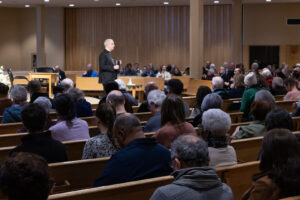
“Before this evening, if someone had asked me about this topic, I would have said ‘Don’t even go there’. But now I definitely feel much more comfortable having a conversation.”
Deacon Worthen said the expansion of access to euthanasia and assisted suicide is being initiated and advocated by forceful, yet small, minority. That suggests there is an opportunity for Canadians to rally a strong opposition to expansion.
“What’s required is that we have a pressure group that forces the government in the other direction and that requires the mobilization of people such as yourselves who are willing to stand up and make your voice known.”
Archbishop Richard Smith also called for Catholics to be bold.
“As Albertans we tend not to hesitate to let people know what we think. So this is where [we need] to take this inherent gift of Albertans and make it real,” said Smith.
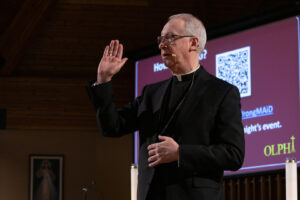
“So go pick up the phone. Go knock on the door of the constituency office. [Tell your MP] ‘We need to talk and if not now, when can I come see you?’ Write the letters. Do whatever we need to take action in that Albertan way of saying, ‘This is wrong. . . and what are you going to do about it? And how can you support you with your work in the legislature, in Parliament?’”
Deacon Worthen encouraged the audience to take action by accessing No Options, No Choice, a CMDA initiative that streamlines the process of writing letters to MPs to protest of the legality and access expansion of assisted suicide and euthanasia.
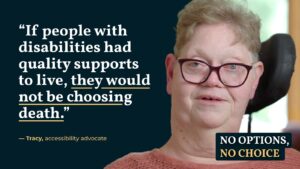
To date, Deacon Worthen estimates that 10,000 letters have been sent out via No Options, No Choice. People who attended the public lecture snapped up all 250 postcards for No Options, No Choice. More have been printed and are available at Our Lady of Perpetual Help Catholic Church.
Sarah Makarewicz, a third-year medical student at the University of Alberta, is determined to build a culture of life in her practice of medicine.
“Caring for people who are vulnerable is definitely at the heart of medicine and being a healing service, imitating Christ\’s love, is something I strive to do and be every day.”
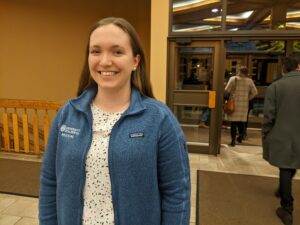
Makarewicz said she’s encouraged to know that there is support in the fight against a culture of death in the medical field.
“I [gain] strength and resilience from knowing that there\’s a community of fellow Catholics who believe this is wrong and who will support me. Organizations like the Christian Medical and Dental Association or Canadian Physicians for Life. It gives me hope.”
Vanessa Macdonald, who was in the audience for Deacon Worthen’s lecture, agreed that it is critical that Canadians support one another.
“This is very important for all Canadians. No matter what age or stage you\’re in, we need more voices promoting the truth. I think it is a quiet majority that have not spoken up in society, and even in Parliament, to say that they do not want MAiD.”
Upfront with the Archbishop – Archbishop Smith\’s biweekly podcast – will release an episode with Deacon Larry Worthen on March 5. Subscribe here to get the episode delivered to your inbox.
Join the fight against a culture of death with Hope and Dignity, our Archdiocesan initiative for defending the vulnerable and building a culture of life.
Watch the full livestream of “What\’s Wrong with MAiD” here.
Write a letter to your Member of Parliament today with the template at No Options, No Choice.
Jenny Connelly – Archdiocese of Edmonton

